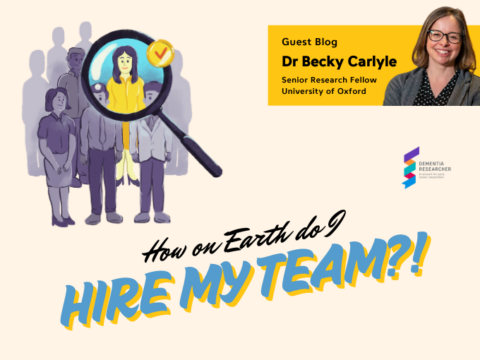This wasn’t the blog post I was intending on writing next, but at a recent dementia conference, I realised one of the apparent academic superpowers that I am comfortable employing whenever the need arises, without really thinking about it. Not in a Spider-Man kind of way, more in a “oh…other people do not have an easy time doing this thing I find very easy” kind of way.
That thing was saying no, or more broadly, the challenge of advocating for yourself in the world of academia. I haven’t really had to think about why I find this easy before, but after realising it’s something many people struggle with, I figured that it may be helpful to some if I share what has been helpful for me. Quick disclaimer that this is not going to work for everyone and is very biased to my own experience, but hopefully it may be useful to some of you who are reading or listening to this.
The best place to start with this is probably to acknowledge what tools are necessary for self-advocacy, and why the inherent nature of academia can make achieving these more of a challenge than in other contexts, thereby meaning that for some of us, there is also a discrepancy between our capacity to advocate in academic contexts compared with those external to academia. Ultimately, to advocate for yourself you need to know yourself, what it is that you need, and how it is that you get there. But that isn’t always so easy in the ever-shifting and highly competitive context of academia. I don’t know about you, but I got into academia not fully understanding the pathway and how exactly you travel through it. Even now as a postdoc, I feel confused about a lot of it. And if you don’t know what it is that you need then how can you know how to get there? And then knowing yourself? In an academic world where at its most extreme, work is king and you live nose to the grindstone? Yeah, good luck with that… If the time that you spend with yourself is exclusively work-related, how can you possibly know the you for whom you would even be advocating?
 With all of this in mind, you can see how the capacity to self-advocate soon ends up off-kilter, and we end up needing to trust in our superiors to lead us towards positive things that help us progress in our careers. Sometimes this works well, where those in charge of our work are very helpful and on top of what we need to do, but sometimes they can ask too much of us. When I hear people talk about their workload at its most extreme, I am sadly often reminded of that James Acaster joke from his stand-up special, Repertoire (highly recommend) – “Some of you don’t even refer to it as sleep. You refer to it as ‘no more jobs’, that’s what you call it. You have no more jobs, and then you wake up in the morning, then it’s jobs again. And then no more jobs, and then jobs – isn’t that just your whole life? There’s no more jobs and jobs on a constant loop. Til eventually one day, permanently no jobs forever.”
With all of this in mind, you can see how the capacity to self-advocate soon ends up off-kilter, and we end up needing to trust in our superiors to lead us towards positive things that help us progress in our careers. Sometimes this works well, where those in charge of our work are very helpful and on top of what we need to do, but sometimes they can ask too much of us. When I hear people talk about their workload at its most extreme, I am sadly often reminded of that James Acaster joke from his stand-up special, Repertoire (highly recommend) – “Some of you don’t even refer to it as sleep. You refer to it as ‘no more jobs’, that’s what you call it. You have no more jobs, and then you wake up in the morning, then it’s jobs again. And then no more jobs, and then jobs – isn’t that just your whole life? There’s no more jobs and jobs on a constant loop. Til eventually one day, permanently no jobs forever.”
The first time I heard this joke was during my PhD, when it was exactly both the very right and very wrong time to hear it. I was very much living in the jobs/no more jobs cycle and I realised that I didn’t want to do that forever, and there was a real, marked shift in my capacity for self-advocacy. It wasn’t an overnight thing, but I did realise I was putting a job before myself. The break to my cycle was the transition from PhD to post-doc, supervisor mismatch to excellent supervision, and an unrelated location change from England back home to Scotland. It doesn’t need to be as all-encompassing a change as this, but admittedly made it far easier than it would have been to change my advocacy habits whilst continuing in the same job. That being said, self-advocacy is a process and it is still something that I am improving as I go and as I understand myself, my intersectionality, and my position within academia more.
This is all well and good, but how are we supposed to start saying no to what is asked of us that is above and beyond our job requirements, when we are perpetually reminded of job scarcity and time-limited by goalposts related to our careers? This is the bit that is always a work in progress, even if you are good at the self-advocacy stuff. It is worth remembering that for a lot of us, the nature of a PhD and the related overwork and publish-or-perish narrative that many (not all of us) experience really predisposes us to accepting the unrealistic requests of academia. So too, is academia a machine that our supervisors exist within and, whether we see it or not, they experience these pressures too. No-one is entirely free of it, and it is for that reason that I believe the unrealistic requests that often lead to us having to say no are never malicious, simply forgetful or often, as was the way in my PhD, thinking out loud. I remember being terrified of saying no to my PhD supervisor, but when I eventually did, there was just a neutral response of “ok, that’s fine, you have got a lot happening already.”
The other argument that is often posited to me, and the minimal discussion I have had around this topic before deep-diving into my thoughts after the aforementioned conference, has been centred around the idea that we need to keep going and pushing beyond the 9-5 (or whatever your own standard working hours are) for our patients. Agree with the sentiment or not, that narrative is manipulative. And sometimes – often – we try so hard to advocate for our patients that we forget to advocate for ourselves. We know that better work is done by those who are well-rested and recuperated, and that is actually what our patients deserve.
When everyone we work with is also in this academic machine and can fall foul of its expectations, how best to approach improving self-advocacy is admittedly specific to an individual. But, here are some things I have found useful as a grounding to allow for easier self-advocacy in academia:
- Remember, it is just a job. No, really, I promise. It’s just a job. It might be one with more pressure than the average, but it is ultimately just a job. Acknowledging and affirming this has really taken the wind out of the sails of much of the stressful and burdenous feeling of competition within academia. Of course, some of the competition is important and unavoidable. But if you are feeling in a state of competition all day every day, the related pressure and stress will do a number on you over time.
- Academia isn’t the only way to be a scientist and deciding to never work as a scientist again is ok too. Back to that old pipeline, my favourite. If your experience of academia has been anything like mine, you’ll have sat through many talks where people worry about this leaking pipeline. I hate this analogy (so much so that I have a whole blog post on it), and I have found it helpful to acknowledge that whilst the formidable beast of academia certainly does need to do something about the constant leaking, particularly with regards to diverse identities, you do not owe it to academia to be the person who stays to allow them to say that a leak is ‘fixed.’ Academia is right for me now, and hopefully will continue to be so in future, but I owe it to myself and future me to leave if it ever feels wrong for me. Easier said than done, I am sure, but something I try to always keep in mind.
- You’re entitled to a work-life balance. If your friend was describing some of the expectations you describe, how would you feel about it?
- It is absolutely ok to question ‘why?’ when you are asked to do things that that require an additional expectation from you that is outside the bounds of your usual work life, be that by merit of time, cognitive energy, or both.
- Don’t comment on other people’s working habits and timings. When people do this, it is normally for negative reasons, whether they have insight into that individual’s circumstances or not. Putting these expectations on them also puts them on you and anyone else in the same lab or with the same supervisor and perpetuates unrealistic expectations that damage everyone.
- Recognise that your time is worth something. If you are going to work beyond the time you are paid for and there is no clear academic or financial benefit, why are you doing it?
- Know and remember that your supervisors and line managers are fallible people who also have rich lives and can have bad days.
- Practice saying no. It might sound silly but the more you say it, the easier it gets.
- The burden of all dementia research isn’t entirely on your shoulders, even if there are times it feels like it.
- You’re allowed to advocate for yourself. I wish someone had told me that a long time ago.

Jodi Watt
Author
Dr Jodi Watt is a Postdoctoral Researcher at University of Glasgow. Jodi’s academic interests are in both healthy ageing and neurodegenerative diseases of older age, and they are currently working on drug repurposing for dementia. Previously they worked on understanding structural, metabolic and physiological brain changes with age, as measured using magnetic resonance imaging. As a queer and neurodiverse person, Jodi is also incredibly interested in improving diversity and inclusion practices both within and outside of the academic context.

 Print This Post
Print This Post






